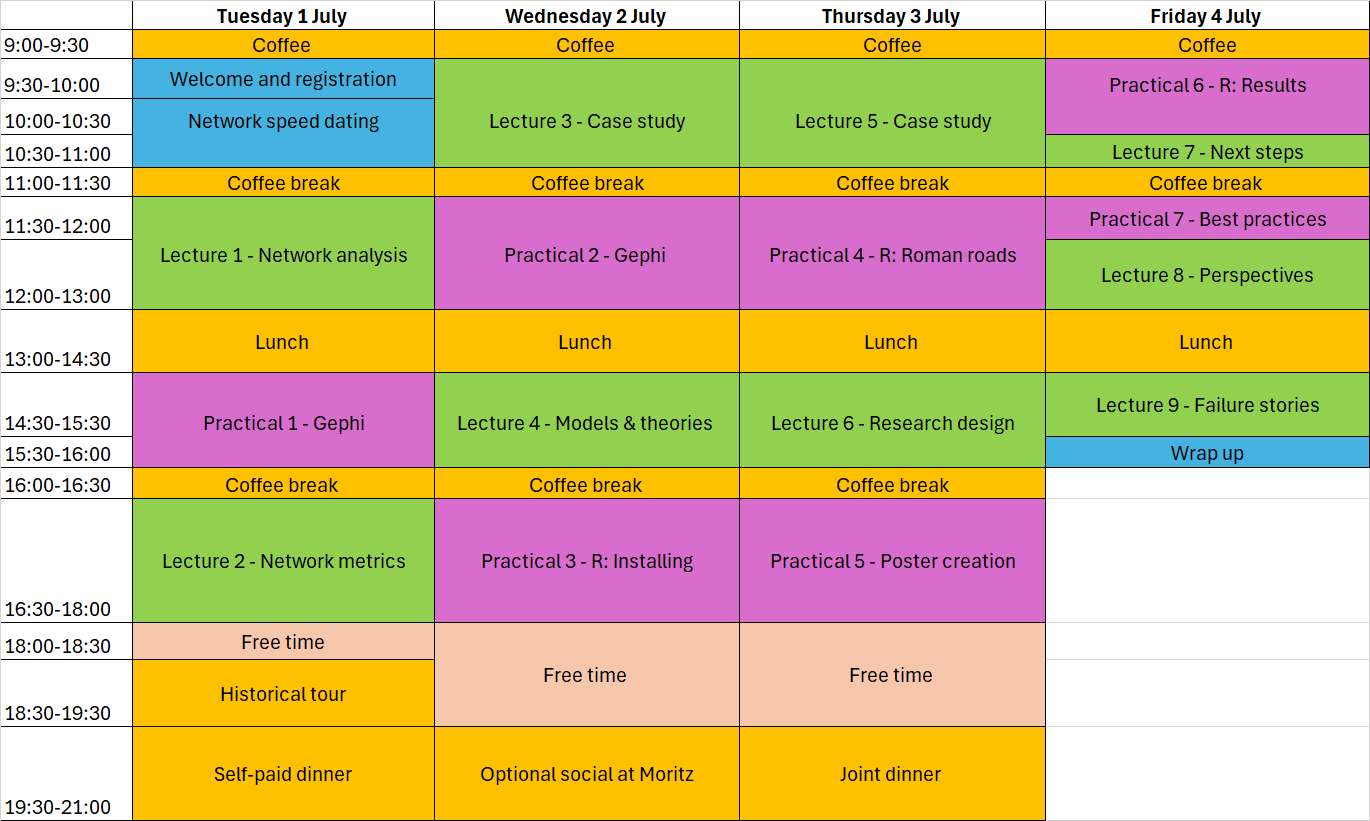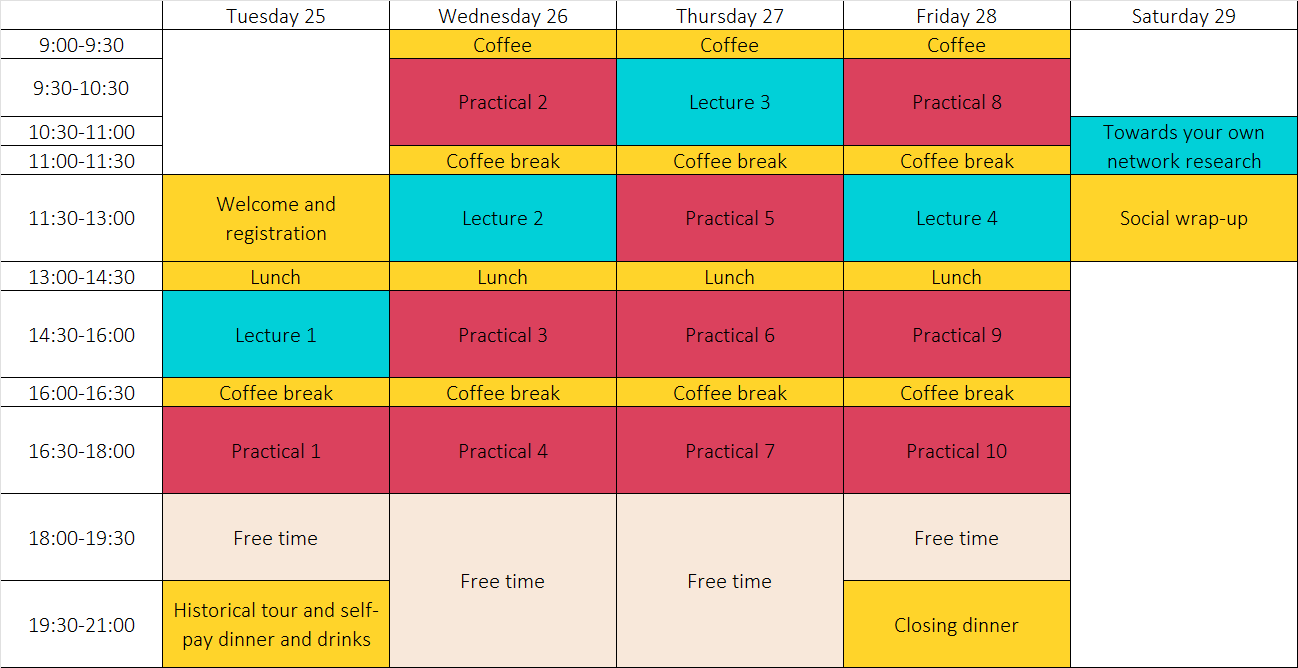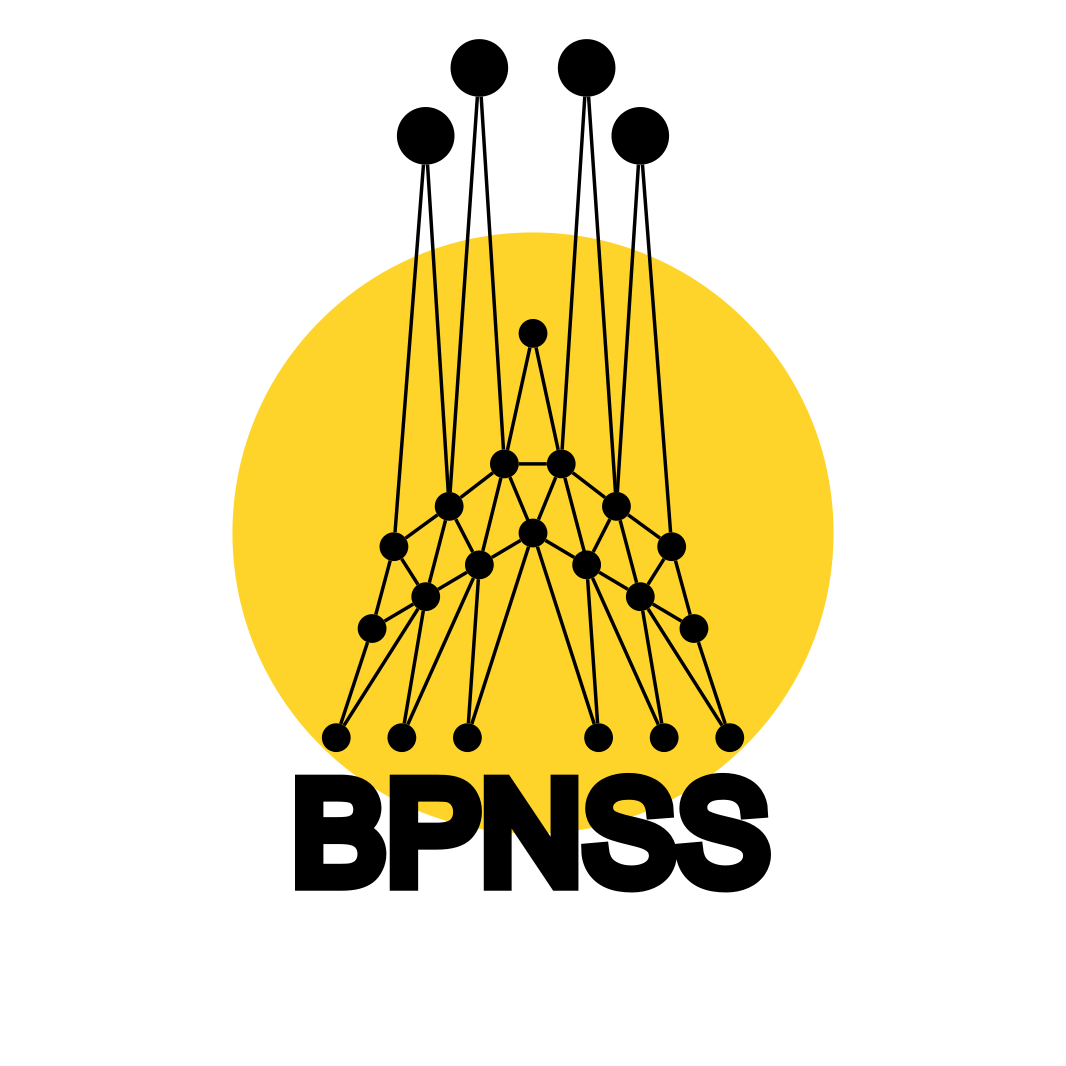Past Editions
2025
At a glance
The 4-day programme consists of lectures and discussions, hands-on practicals, and socials. 
Lectures overview
Day 1: Welcome and Introduction
| Class/Event | Description | Lecturer |
|---|---|---|
| Welcome | Network speed dating | Martin |
| Lecture 1 | Introduction to network analysis in history and archaeology | Tom |
| Practical 1 | Network research with Gephi | Martin |
| Lecture 2 | Introduction to network metrics | Albert |
Day 2
| Class/Event | Description | Lecturer |
|---|---|---|
| Lecture 3 | Making sense of a network | Martin |
| Practical 2 | Gephi practical 2 | Martin |
| Lecture 4 | Network science models and theories | Sergi |
| Practical 3 | R: Installing, workspace, libraries, data | Tom and Matteo |
Day 3
| Class/Event | Description | Lecturer |
|---|---|---|
| Lecture 5 | Introduction to the case study of the R practical | Tom |
| Practical 4 | R practical 1: network analysis of Roman roads | Tom and Matteo |
| Lecture 6 | Research design | Cindarella |
| Practical 5 | Poster creation | Cindarella and Iza |
Day 4: Projects & critical perspectives
| Class/Event | Description | Lecturer |
|---|---|---|
| Practical 6 | R practical 2: : network analysis of Roman roads, significance of results | Tom and Matteo |
| Lecture 7 | Next steps for the case study: theories, models and methods | Tom |
| Practical 7 | Best practices: data and results deposition and documentation | Matteo |
| Lecture 8 | Critical Perspectives | Cindarella |
| Lecture 9 | Reality Check | Everybody |
| Wrap up | Next steps, conferences, resources, publications and evaluation reminder | Everybody |
Preparations for the BPNSS 2025:
As part of your preparation, please follow the instructions below to ensure that you are ready to engage fully in the program.
Remember the following:
- Laptop with administrator rights in case you need to install software or packages on the fly. Please note that tablets cannot be used for the practicals of the summer school!
- Laptop charger cable.
Preparations:
- Please install Gephi https://gephi.org/.
- Please install both R and RStudio separately: follow 1.1-1.3 of this tutorial https://book.archnetworks.net/gettingstarted. On that page you will find download links for R (which needs to be installed first) and R Studio and all instructions you need.
- (optional) In RStudio, consider already installing all packages that could be used in the tutorials, see section 2.3. https://book.archnetworks.net/dataandworkspace#PrimaryPackagesPlease (this is particularly valuable for those with restricted administrator rights on their laptops).
- Also check the suggested workspace setup in section 2.4 here https://book.archnetworks.net/dataandworkspace#WorkspaceSetup
- (optional) Feel free to get familiar with RStudio by doing the rest of that tutorial 1.4-1.11.
Prior reading and resources:
- Check out this BPNSS document if you would like to do some reading ahead of the summer school, watch some tutorial videos, or explore the resources of our community: https://docs.google.com/document/d/1e4UwRiMOHDkpwfnVBH-fzylnya2-AlEV7fBhDj5lnyE/edit?usp=sharing.
2024
The first edition of the Barcelona Summer School took place from 25th to 29th June 2024. Twenty-eight people participated in the school.
Venues 2024
The school took place in the Centre Cívic Convent de Sant Agustí, in the city centre of Barcelona and in the University of Barcelona Physics Faculty.
The closing dinner was held on Friday 28th in the restaurant Buenissimo.
Programme 2024
The school is structured around theoretical lectures and computational practicals, alongside many socials.

Day 1 – Welcome & Introduction
- Opening social
- Lecture 1: Introduction to the summer school - what, why, and how of past network research
- Practical 1: Computational basics - set up coding workspace, and read network data
Day 2 – Data & Methods
- Practical 2: How to obtain, create, and clean network data
- Lecture 2: Network analysis and methods
- Practical 3: Exploratory network analysis
- Practical 4: Network visualization techniques 1: plotline/ggplot2
Day 3 – How to tackle a project?
- Lecture 3: Research design
- Practical 5: Networks as a model, a tool to gain insight into phenomena and data. Poster creation
- Practical 6: Network visualization techniques 2: Gephi tutorial
- Practical 7: Best practices: data and results deposition and documentation
Day 4 – Projects & Critical Perspectives
- Practical 8: Work on projects
- Lecture 4: Critical perspectives on historical and archaeological data
- Practical 9: Work on projects or elective advanced tutorial
- Practical 10: Work on projects or elective advanced tutorial
Day 5 – Discussion & Moving Forward
- Developing your own future past network research projects. Discussion and evaluation
- How to take the next steps in the past networks community – conferences, resources and publications
